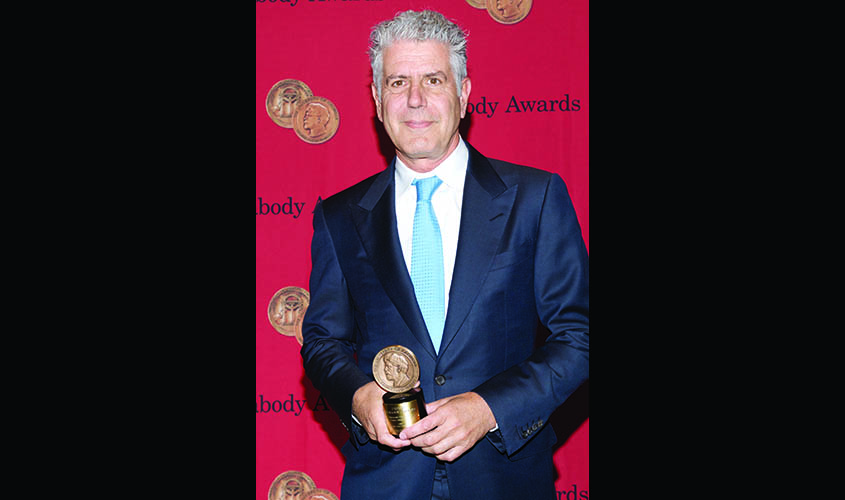‘Being a chef is a lot like being an air-traffic controller: you are constantly dealing with the threat of disaster. You’ve got to be Mom and Dad, drill sergeant, detective, psychiatrist, and priest to a crew of opportunistic, mercenary hooligans, whom you must protect from the nefarious and often foolish strategies of owners,” wrote celebrity chef and television host Anthony Bourdain in his essay “Don’t Eat Before Reading This”, published in 1999 in the New Yorker.
It was this piece that changed everything for the financially stressed Bourdain, helping him to establish himself as an author with his first book, Kitchen Confidential: Adventures in the Culinary Underbelly in 2000. The success of the book marked the beginning of Bourdain’s career as a world-famous chef and food writer, who journeyed into little-known cultures and returned with knowledge that wasn’t restricted to food.
Bourdain, the nomadic chef, was known for his energy, and his insatiable curiosity of how the world works. Set against those life-affirming aspects of his personality, the news of his death becomes all the more shocking.
On 8 June, he was found dead in his hotel room in a French village. According to the prosecutor of Colmar in France’s Alsace region, Bourdain committed suicide by hanging himself in the hotel’s bathroom. The 61-year-old celebrity chef was supposed to head to Strasbourg, on France’s border with Germany, to shoot an episode of his Emmy Award-winning travel show, Parts Unknown, for CNN.
In a statement, CNN said, “It is with extraordinary sadness we can confirm the death of our friend and colleague, Anthony Bourdain. His love of great adventure, new friends, fine food and drink and the remarkable stories of the world made him a unique storyteller. His talents never ceased to amaze us and we will miss him very much. Our thoughts and prayers are with his daughter and family at this incredibly difficult time.”
Bourdain’s devil-may-care attitude, his interest in foreign cultures, and his understanding of food made him stand out among his contemporaries.
As a teenager, his first job was that of a dishwasher in Massachusetts. This job, as Bourdain said time and again, taught him all the important lessons in life.
In 1978, he graduated from the Culinary Institute of America. In the early phase of his professional career, Bourdain worked as an executive chef at the Brasserie Les Halles in Manhattan for more than a decade.
His first food and travel television show was A Cook’s Tour, which ran for 35 episodes on the Food Network in 2002 and 2003. He then started hosting a couple of widely watched shows on the Travel Channel: Anthony Bourdain: No Reservations (2005–2012) and The Layover (2011–2013). It was at this time that his image as a “bad boy chef” was formed, thanks to his straightforward demeanour and his wry humour. He shifted to CNN in 2013, for what became his best-known show, Anthony Bourdain: Parts Unknown.
Bourdain’s TV shows—which explored how food shapes a people’s culture and history—were different from other cookery shows. They could be watched by viewers who had no interest in food as such.
So was the nomadic chef also an expert journalist? Bourdain didn’t like to be called a journalist, though. He preferred the term “enthusiast”, and everything he did was energised by his enthusiasm. He frequently shot in countries like Iran, Senegal and Lebanon—places that are off-limits for most documentary makers.
His visits to India also generated a lot of attention. Bourdain travelled to parts of Rajasthan, Kerala, West Bengal, Punjab, Maharashtra and Himachal Pradesh for his various shows shot here.
In India, he was especially intrigued by the variety and range of vegetarian dishes on offer. In an episode of Parts Unknown, reported from Punjab, Bourdain said, “India is one of the few places on earth where even for me [eating vegetarian food] is not a burden. In Punjab meat or no meat, you are almost guaranteed of intense colours, flavours and spices… If this is what vegetarianism meant in most of the places in the West, I’d be at least half as much of a d**k about this subject.”
On one of his India visits in 2017, he was interviewed by Vogue India, where he talked about his impressions of this country: “In India—Punjab in particular—the thing you notice first, the thing that stays with you, is the colours. It’s like somebody, just before you got off the plane, changed the lenses in your head, which turned up your colour receptors from 7 to like 14.”
He felt the same sensory overload while shooting one of his episodes in an Udaipur market: “The sacks of deep bleeding red hot chillies, astounding varieties of vegetables, the huge bowls of rice, pulses and corn… the strikingly beautiful colours of women’s sarees and the smiling faces of the children define the essence of this wonderful region.”
Bourdain’s colourful life, however, had an underlying strain of darkness that people only got to know about when they heard the heartbreaking news of his suicide.

